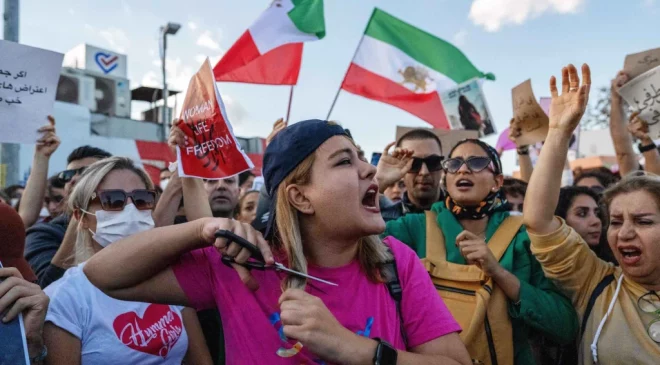
Iranian authorities have ramped up their repression on civil society as the one-year anniversary of the death in custody of Mahsa Jina Amini that resulted nationwide protests nears, Human Rights Watch said today. All delegations of UN member states meeting Iranian counterparts during the annual UN General Assembly leaders’ week in New York should raise the plight of activists and put it at the center of their engagement.
Iranian authorities have increased their crackdown on peaceful dissent and expression through intimidation, arrests, prosecutions, and trials of activists, artists, dissidents, lawyers, academics, students, and family members of those who were killed during the 2022 protests. They have also responded to the widespread defiance of the compulsory hijab by ramping up their efforts to impose the dress code on women, using a range of tactics, including legal summonses, new legislative initiatives, and increasing pressure on private business to impose hijab rules.
“Iranian authorities are trying to impose a chokehold on dissent to prevent public commemoration of Mahsa Jina Amini’s death in custody, which has become the symbol of the government’s systematic oppression of women, injustice and impunity,” said Tara Sepehri Far, senior Iran researcher at Human Rights Watch. “But Iranian authorities can’t erase the mounting frustration, louder calls for fundamental change, and the resistance and solidarity in Iranian society in the face of mounting repression.”
The authorities have targeted outspoken family members of those killed or executed during the protests and have escalated their pressure on these families in recent months.
Human rights groups are investigating the killing of more than 500 people, including 69 children, during the protests. Human Rights Watch has compiled reports of family members of at least 36 people who were killed or executed following unfair trials during last year’s protests who have been either interrogated, arrested, prosecuted and/or sentenced to time in prison over the past month. On August 14, BBC Persian reported that the authorities had pressured families of those who were killed during the protests to avoid holding memorial services for their loved ones.
The crackdown has also escalated on college campuses. Human Rights Watch has compiled cases in which at least 27 university instructors who were critical of government policies were dismissed, suspended, forced to retire, or their contracts were not renewed since late July, before the start of this academic year. The actual number is most likely higher.
On August 14, Shargh daily paper reported that university administrators had escalated pressure on students, subjecting dozens of students at Allameh Tababayi, Tarbiat Modarres, and Booali Sina universities to disciplinary measures. According to the Volunteer Committee to Follow-Up on the Situation of Detainees database, since last September, at least 161 students have been subjected to disciplinary measures for their activism related to the protests.
In February, Iranian authorities announced a broad amnesty, which included releases, pardons, or reduced sentences for those arrested, charged, or detained during Iran’s widespread protests. Following the amnesty announcement, Iranian authorities released many of those who had been arrested. On March 13, Hojatollah Eslam Ejeyi, the head of Iran’s judiciary said in an interview that 22,000 people were included in the amnesty orders related to the protests.
In addition to their brutal crackdown on peaceful dissent, since the beginning of summer, Iranian authorities have ramped up their coordinated pressure to enforce compulsory hijab laws in the country. The authorities have prosecuted women, including celebrities, for appearing in public without the hijab, issued traffic citations to cars carrying passengers without the hijab, and shut down businesses, including cafes and private sector offices, for not complying with hijab laws, according to numerous domestic media reports.
In recent cases, Iran’s judiciary has ordered at least two actresses convicted for not complying with compulsory hijab laws to undergo psychological treatment. Iranian mental health associations have protested the orders.
The Parliamentary Judiciary Committee is currently reviewing a 70-article draft Hijab and Chastity Bill that envisions additional penalties, including additional fines and dismissal from job and educational opportunities, for those appearing without the hijab. On August 13, Iran’s parliament moved the legislation forward to parliamentary judiciary committee review, without public debate about the draft law.
Iranian authorities brutally repressed the widespread protests that erupted in September of 2022, using excessive and lethal force and arresting tens of thousands of protesters and peaceful dissidents. Human Rights Watch has documented widespread use of violence and mistreatment, including sexual harassment and torture and serious violations of due process against those arrested, including children. The authorities have executed seven people who were sentenced in trials that fell grossly short of international standards in connection to the protests.
“The international community was vocal in supporting the protest movement when people took to the streets in Iran last year,” Sepehri Far said. “But achieving the rights and equality the protesters demanded is the work of generations, not months. Those who spokes out should now focus on supporting activists, artists, academics, lawyers, students, families of those killed, members of civil society and all those paying a very steep price for their ongoing resistance to oppression.”
